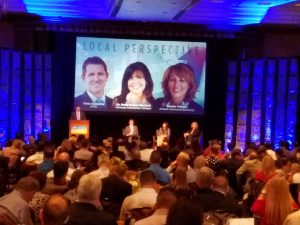 After attending the SRP Economic Forecast presentation and hearing from the experts, it appears our economy is continuing its steady, post-recession growth. The challenge is in knowing what to do, and what not to do, in order to keep it that way.
After attending the SRP Economic Forecast presentation and hearing from the experts, it appears our economy is continuing its steady, post-recession growth. The challenge is in knowing what to do, and what not to do, in order to keep it that way.
It was a pleasure to hear Mr. Todd Buchholz, a best-selling author, popular pundit, keynote speaker and former White House senior economic advisor, share his thoughts on what the future holds re: jobs, growth and the economy for 2018 and beyond.
He didn’t make me want to secure my home’s inventory of sharp objects. If I’d been on a ledge his talk would have brought me down. He was actually quite optimistic and very entertaining. And he didn’t talk politics.
Local perspective views from Chris Camacho, President and CEO of the Greater Phoenix Economic Council, Dr. Maria Harper-Marinick, Chancellor of the Maricopa Community College district and Sandra Watson, President and CEO of the Arizona Commerce Authority were equally positive.
They all produced dramatic growth figures and case studies to confirm we’re on the right track. Especially in one area that, more than any other, will determine our future success. More on this later.
I have some takeaways, starting with the obvious; there’s always going to be the potential for disaster, somewhere and somehow, natural or man-made, that can negatively impact our economy. We can’t worry about those things, they’re usually out of our hands anyway.
But we do need to be aware of how ‘loose lips sink ships.’
That was a war term telling everyone to keep their mouth shut in case the enemy happened to be in earshot. It still works today, because markets, finance, industry, multi-national corporations and governments tend to react chicken little -like to the least little things. A tweet here, an interview there, someone caught on a hot mike or worse and then, suddenly, a global-impacting reaction of unforeseeable weight and breadth becomes possible.
We can’t control the media content but we can certainly avoid panic-driven tsunamis of financial fear and ruin, all based on speculation, because of a breaking story on cable news.
Buchholz said he thought the oil and energy industries would remain fairly stable. He commented how we have to root for worldwide prosperity but we should be especially concerned with the economy in China and the European Union after Brexit. North Korea is a wild card that could blow up (no pun intended) the global economy; the situation needs a peaceful resolution quickly. America should continue to have low inflation. Retail needs to survive the Amazon syndrome. And we need to avoid unnecessary, economy-damaging trade wars.
All this was good to hear. As the developers of Attesa, our $1.3 billion motorsports and transportation technology community now nearing the end of the entitlement process in Pinal County, we were glad to learn the future is actually brighter than many perceive.
As long as we don’t screw up.
And the best way to avoid screwing up our future is by investing in education. All kinds of education.
Buchholz gave great kudos to Arizona, it’s universities and community colleges, noting that ASU had, for the third year in a row, been named the most innovative school in America by U.S. News and World Report.
He shared how investments in STEM (science, technology, engineering and math) programs were no brainers but America needs vocational workers, too.
We need workers who do what the engineers say needs to be done. We need tradesmen and craftsmen and truly skilled laborers who can do with their hands and arms and backs and legs what others cannot, or will not do.
Another point that struck home. Buchholz mentioned how we either train someone how to be a plumber or we teach someone else on how to run a plumbing company. But we never teach a plumber how to start his own plumbing company.
The best way we can place our economic and societal future at risk, especially in competition with other states and countries, is by ignoring or discounting the value of training and education.
Because when an Amazon, Microsoft, Mercedes Benz or some other large company begins its search for a new location, bringing jobs and a boosted economy along, the list of selection criteria starts with the availability of an educated work force.
